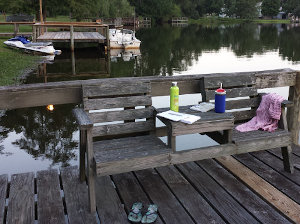AmblesideOnline's Patio Chats:
13. More on Narration

Let's talk more about narration. Recent studies are coming to the same conclusion Charlotte Mason came to a hundred years ago: there's no more effective tool for making knowledge stick than narration. It may look inconsequential, but a whole lot of learning is going on when your child is narrating -- in fact, he's learning even when he's mentally preparing himself to tell back, even if he isn't actually called on to narrate!
But what if it doesn't happen so naturally? What if, "can you tell back the story?" doesn't work, and your child says, "I don't know," or just stares at you blankly? What then?
Some parents have started their child off: "There was a king and his name was . . ." Some use a little fun and make it silly, "It was about a pink bunny who bought some chewing gum, right?" and that sometimes gets their child going.
What about prompting the child with, "What was the king's name? Yes, and what did he take from the castle? Do you remember what he wore at his side?" No, that's not really narrating. That's your child telling you your own thoughts. What we're after is what comes from him, all by himself. After he's done, you can add a comment of your own (but, please -- make it a brief comment to get his mind thinking, and not a lecture), but in the narration phase, get out of the way and leave your child to do his own thinking, because it's while he's doing his own thinking that the best learning is happening.
What if misses some of the details? What if he forgets to mention the date? Don't worry, he'll get better at this. You can make that your brief comment, or if you're on top of things before the school day starts, you can give a hint about what you hope he'll remember by writing a couple of words down to introduce the reading: "Today we're going to read about what William the Conqueror did in 1066." But remember -- narrating is your child's work, not yours.
"A narration should have the child's unique stamp on it as evidence that the material has been assimilated and gone through some processing in his mind." [from Charlotte Mason's Vol. 1 pg 289]
[Today's patio chat comes from Principle 15]

